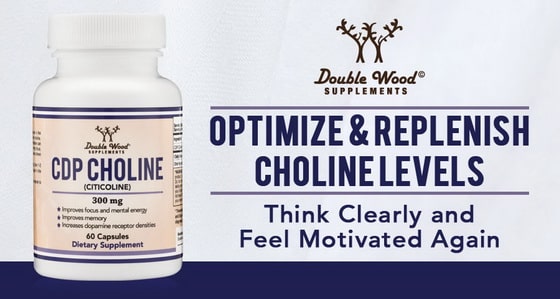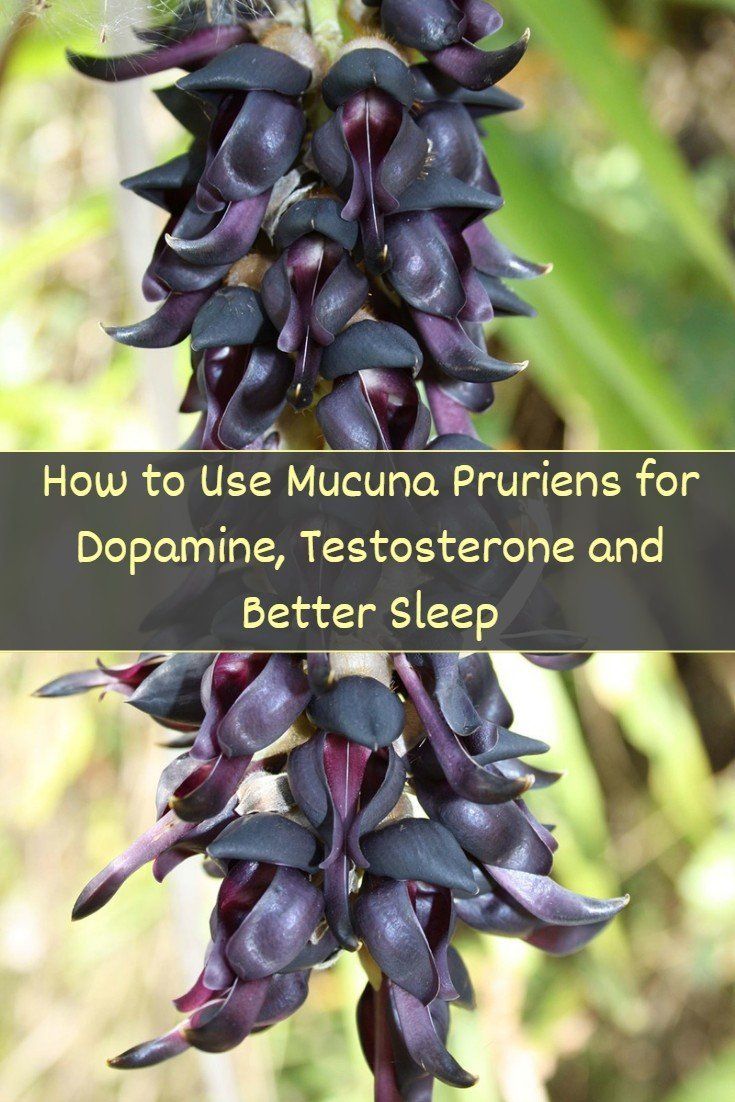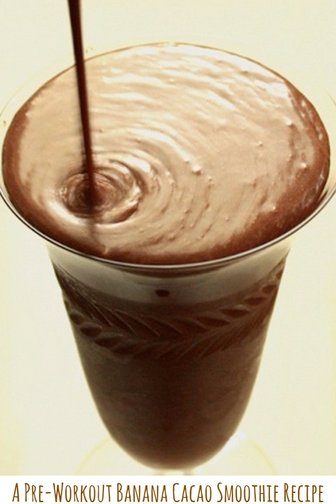Mucuna Pruriens Benefits for Testosterone, Mood Enhancement and Better Sleep
 Mucuna pruriens is one of the more potent mood enhancing and libido stimulating superfoods available, with noticeable benefits and a long list of uses.
Mucuna pruriens is one of the more potent mood enhancing and libido stimulating superfoods available, with noticeable benefits and a long list of uses.
This powerful herb can have a direct influence on your brain’s neurotransmitters and potentially have beneficial effects on your mental state, energy levels, ability to relax and even body composition and testosterone levels.
Mucuna isn’t for everyone though and it’s important to read the dosage information and potential precautions before taking it.
Both the strength and quality of supplements can vary greatly but there are details on high potency capsules like these and an organic kapikachhu powder in the mucuna dosage section ahead.
What is Mucuna Pruriens?
Mucuna pruriens is a tropical vine that produces bean pods covered in prickly velvet hair. The seeds inside of these pods are the most valuable part of the plant from a medicinal point of view.
Also known as kapikachhu, cowhage and velvet bean, mucuna pruriens has been used for centuries in many traditional cultures as a healing plant for a variety of different ailments.
In Ayurvedic medicine, kapikachhu is known as a nerve tonic and adaptogen that helps the body deal with stress. It is one of the few herbs, alongside ginseng, brahmi and the amla, known to balance all three of the doshas. It also has quite a reputation as an aphrodisiac.
Modern science has revealed the velvet bean to be one of the best food sources of the amino acid L-dopa. Also called levodopa, L-dopa is a direct precursor to dopamine, a powerful neurotransmitter in your brain involved in mood, alertness, sexuality and many other important functions.
Dopamine doesn’t cross the blood brain barrier so it cannot be taken or administered directly for therapeutic results. You can however potentially increase your dopamine levels if you’re low on it by making available more of the amino acid L-dopa for dopamine creation.
 Magnesium L Threonate (Magtein) | Highly Bioavailable Form for Healthy Sleep Habits and Improved Cognitive Function + Memory | 2,000 mg, 100 Capsules, Best Value
Magnesium L Threonate (Magtein) | Highly Bioavailable Form for Healthy Sleep Habits and Improved Cognitive Function + Memory | 2,000 mg, 100 Capsules, Best Value
Low Dopamine and L-Dopa
The neurotransmitter dopamine acts upon your central nervous system and, in concert with other neurotransmitters, plays a vital role in motivation, attention, memory, mood, relaxation, sexual desire, sleep and many other areas. You can read much more on the complexities of how dopamine works here.
Regularly using stimulants like caffeine, high levels of sugar, nicotine and other drugs can lead to a lowering of dopamine production in the brain and leave you feeling edgy, craving food, restless and unable to relax.
Possible longer-term symptoms of low dopamine levels include difficulty concentrating, constant tension, social anxiety, general negativity, ongoing low-energy and decreased libido.
People suffering Parkinson’s disease are known to lack dopamine in the brain and some research has shown that mucuna pruriens may benefit the condition. Scientists are also studying the link between low dopamine and depression.

If mucuna pruriens and its L-dopa can be used to normalize dopamine levels for those suffering from Parkinson’s disease or clinical depression it may have important applications as a treatment. Especially since mucuna extract has been shown to be more effective than isolated L-dopa in research studies.
That said, Parkinson’s is a very serious disease and the causes of depressions are varied. Both should be treated by a doctor and the use of herbal supplements discussed first.
Particularly in the case of serious depression, mucuna would not be appropriate for many people. This is especially true in cases where symptoms manifest as occasional mania alongside depression as too much dopamine may only increase problems.
Kapikachhu for Mood Enhancement
For someone experiencing lowered dopamine levels due to stimulant use and the stresses of modern life, the benefits of taking mucuna can include a significantly positive effect on their mood. It is, in fact, often described as a natural nootropic.
Research like this study shows the L-dopa in mucuna pruriens increases dopamine in the brain cortex. Many people report mood enhancement and elevated alertness within an hour of taking kapikachhu powder or mucuna pruriens supplements on an empty stomach.
It’s important to mention though that more is not better in the case of dopamine and you should always stay within the recommended dosage. A gentle increase in available L-dopa for dopamine production can have many beneficial effects on mental and physical well being.
On the other hand, excessively large amounts of L-dopa can produce negative side effects like high blood pressure, tension and nervousness. It really is better to start off slow with mucuna pruriens.
How Mucuna Pruriens Increases Testosterone
Testosterone production plays a central role in libido and sexual performance for both men and women. While women produce much less testosterone than men, it is still a vital hormone for sexual interest and desire.
Mucuna has been used traditionally as an aphrodisiac for both men and women. One of the scientific reasons why the herb has been so effective for this purpose is due to another hormone called prolactin.
Prolactin is a hormone with reproductive, metabolic and immunoregulatory functions. It is needed in small amounts but an excess of estrogen in the body can lead to high levels.
Prolactin tends to counteract testosterone in the body, thus reducing sexual interest. In fact, a common side effect of drugs that stimulate prolactin function is impotence in men and low libido for women.
Increased dopamine from the L-dopa found in a high quality extract powder like this reduces excessive prolactin and increases testosterone in the body. Many women and men quickly notice an increase in sexual desire and performance when taking mucuna from this hormonal shift.
Mucuna for HGH and Muscle Mass
By increasing dopamine levels in your body, mucuna may help increase lean muscle mass by stimulating human growth hormone production.
Dopamine has been shown to increase HGH levels within the body and human growth hormone is known to increase protein synthesis and help stimulate muscle growth.
While just taking a mucuna pruriens capsule and sitting on the couch watching TV won’t build muscles, human growth hormone is a very beneficial substance to have even a little more of in your body.
Known as the anti-aging hormone, HGH also enhances fat burning, elevates sexual performance, improves skin tone and texture and has many other positive benefits for your health.

The older we get, the less human growth hormone we produce naturally.
Supplementing with a high potency mucuna pruriens extract, especially if you regularly drink coffee, smoke or eat a lot of sugary foods, may start to help restore depleted HGH levels through elevated dopamine.
We often feel compelled to have caffeine, nicotine or other stimulants because of low dopamine levels, which, in a vicious circle, tend to lead to lower and lower dopamine over time.
Ideally, by gently increasing dopamine with mucuna, it should be possible to reduce the compulsion for stimulants and make it easier to let go of cigarettes, excessive caffeine or addiction to sugary foods.
Better Sleep with Velvet Bean
Dopamine plays an important role in the brain processes that lead to falling asleep and the REM stage of sleep associated with dreaming. It acts upon the pineal gland that produces sleep hormones.
Animal studies have shown that severely reducing dopamine levels in the brain leads to an inability to sleep. It makes sense that even a mild reduction in dopamine and the associated tension and restlessness would be likely to result in trouble sleeping.
Many people who take kapikachhu powder report an improvement in their ability to get to sleep. It’s also common to experience more vivid dreams as a positive side effect of mucuna supplementation.
Elevating dopamine levels too high though may well have the opposite effect so it’s important to start off at a low dosage. Having the herb well before sleep rather than right before bed would also be likely to be more effective.
Top 5 Beneficial Effects of Mucuna Pruriens
- Mucuna gently increases dopamine by providing L-dopa. The herb is one of the best natural sources of the amino acid L-dopa, a direct precursor to the hormone dopamine.
- Increases energy levels, enhances concentration and improves mood. By raising low dopamine levels, mucuna pruriens can have a positive effect on motivation, attention span, general outlook and many other aspects of mental well being.
- Mucuna Pruriens helps reduce excessive prolactin and increases testosterone in the body. Many women and men notice an increase in sexual desire, libido and performance when taking the herb due to higher testosterone levels and mucuna is often considered an aphrodisiac.
- Raising dopamine with mucuna pruriens can stimulate human growth hormone production. Increasing HGH within your body is associated with enhanced muscle growth, improved fat burning and anti-aging effects.
- Mucuna benefits also include improved relaxation and help getting to sleep. Dopamine from L-dopa acts on the pineal gland which secretes sleep hormones. Higher dopamine levels are also associated with lower stress and an improved ability to relax.
Potential Side Effects
 CDP Choline (Citicoline) | Pharmaceutical Grade, Made in the USA | Improves Focus, Memory, Motivation and Mental Energy | Best Value + Free Delivery
CDP Choline (Citicoline) | Pharmaceutical Grade, Made in the USA | Improves Focus, Memory, Motivation and Mental Energy | Best Value + Free Delivery
- People suffering from mental illnesses characterized by highly fluctuating levels of dopamine should avoid mucuna pruriens. It’s best to consult a specialist before using it if you have experienced any mental health issues previously before using kapikachhu powder.
- While mucuna may have potential in treating depression and Parkinson’s disease its use should be supervised by a doctor.
- Due to its ability to reduce prolactin, needed for reproductive function and lactation, velvet bean extracts are not recommended for women who are pregnant or breastfeeding.
- The L-dopa in mucuna pruriens can be used by the body to make melanin. This in itself is not harmful but there are some recommendations that people at risk of melanoma should avoid increasing L-dopa too high.
- Due to the L-dopa in mucuna it is not recommended to be taken with MAO inhibitors or levodopa medications for Parkinson’s disease.
- There’s some evidence that mucuna benefits include moderating blood sugar levels. Those already taking prescription medicines should consult their doctor before taking mucuna pruriens.
Dosage, Timing and Best Price
While it is considered much safer than taking isolated L-dopa, mucuna pruriens can be potent and it’s best to start at a lower dosage so you can monitor your results for the first week.
After that time you can slowly increase the dose if needed. Definitely don’t take a large dose on your first time taking the herb as some people can be sensitive to its effects.
Start off slow with mucuna and never exceed the recommended dosage. It will last much longer and be likely to work more effectively used in small cycled doses, rather than taken in excess.

How to Use Mucuna Capsules
Mucuna pruriens is usually sold in capsules. A good mucuna supplement should indicate that it is made from the seeds found inside the pod, rather than the leaves or root and show its concentration of L-dopa.
100mg is a recommended starting dose and most people will be find this is enough to feel positive effects. More is not necessarily better with this herbal supplement.
This pack of 210 capsules have 100 mg of L-dopa each. Taken at a 1 capsule a day dosage (not the 2 they suggest) a bottle should last you for 7 months which is great value.
It’s better to take mucuna on an empty stomach before food or other supplements as protein and vitamin B6 in particular can interfere with its absorption.
If it is being taken to improve your mental state and mood during the day, then 1 capsule would be taken before breakfast with a large glass of water.
If you’re using the herb primarily to increase libido, it could be taken in the evening, several hours after any food you had in the afternoon and ideally an hour or more before dinner.
After at least a week of using mucuna pruriens with positive results, you could try taking a capsule in both the morning and early evening. It’s much better though to start off with just one at the beginning, whether in the morning or evening, and closely monitor how it makes you feel over the initial few days.
For most people, just 1 capsule a day of mucuna pruriens with 100mg of L-dopa is a good dosage. If you want to take more than 2 capsules a day it would be best to consult a doctor. It’s also strongly recommended to follow the cycling method suggested ahead while using the herb.
How to Use the Organic Powder
For people who prefer to use the whole powdered herb rather than extracts, I like this organic kapikachhu powder used by some Ayurvedic practitioners. It can be mixed directly in water for a more immediate effect or added to a superfood smoothie like one of these without protein powder.
Taking mucuna in this way tends to slow down the rate at which its L-dopa is absorbed and may be a good way for sensitive individuals to have the herb. You still get all the mucuna pruriens benefits discussed above. The effects are just less pronounced and perhaps more long-lasting because of it.
Dosage for mucuna pruriens powder is generally 1 or 2 teaspoons as it is not as concentrated as the capsule extracts. Once again, it’s best to start off slow, perhaps with just half a teaspoon for the
first few days and build your way up to the higher doses, half a teaspoon at a time, over a few weeks.

Cycling and Tolerance Issues
As with any herbal product with strong physiological effects, it’s recommended to take regular breaks to avoid both tolerance and potential dependence. A commonly recommended cycle for taking mucuna pruriens is 5 days on and 2 days off.
Using this cycle, some people take it just on weekdays to help them handle the pressures of their work day effectively and take a break from it on the weekends when they are generally more relaxed anyway.
It is also highly recommended to take a full week off from using velvet bean extract every month so your body doesn’t develop too much of a tolerance to the L-dopa in it.
Diminished effects due to your body becoming too tolerant to L-dopa can be an issue when taking mucuna extract. If you find you are no longer feeling benefits from taking kapikachhu it’s best to take a good break from it.
A month off would be good but at least 2 weeks without taking the powder or capsules. After this time you can try it again at a lower dosage with no more than 100mg of L-dopa.
Sensitive individuals may be better off keeping to a weekly cycle of just 3 days taking mucuna and then 3 or 4 days off a week. This is also considered a safer way of taking the herb for the longer term to avoid your body developing a tolerance to it.
Personal Experience
Have you tried using mucuna pruriens powder or capsules before? I’ve used this natural nootropic 3 or 4 times a week early in the morning for several years with a week off every 4 weeks. I find it gently increases my concentration levels and seems to provide a general sense of well being.
While others have reported more dramatic effects in some of the reviews, the best way I could describe it is that it seems to be much harder to have a bad day when taking good mucuna capsules like these first thing in the morning.
I’d be interested to hear your experiences with it, how taking it made you feel and what you personally found the benefits of mucuna pruriens to be.
 Tired All the Time and Low on Energy? | Alpha-GPC Supports Cognitive Function, Memory, Motivation, Stamina and Strength | USA Made, Third-Party Tested. Lowest Price
Tired All the Time and Low on Energy? | Alpha-GPC Supports Cognitive Function, Memory, Motivation, Stamina and Strength | USA Made, Third-Party Tested. Lowest Price

As an Amazon Associate I may earn from qualifying purchases at no cost to the consumer | Information presented here is for educational purposes only. The content is not intended to be a substitute for professional advice. Statements made have not been evaluated by the FDA and are not intended to diagnose, cure, treat or prevent any condition. Consult your GP before making dietary changes or taking supplements.




